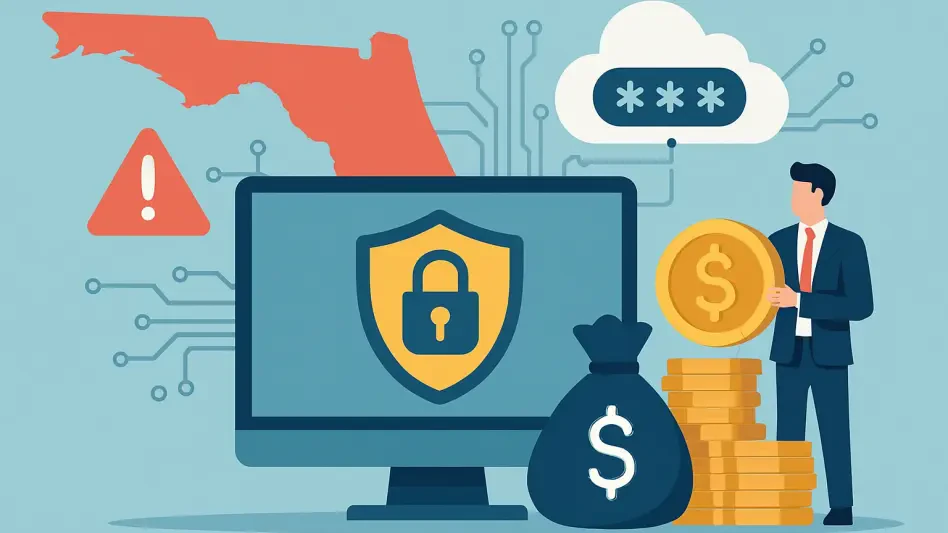In an era where cyber threats loom larger than ever, Florida has positioned itself as a frontrunner in safeguarding local governments from digital attacks through groundbreaking legislation like House Bill 7055 (HB 7055), enacted in 2022. This initiative, championed by State Representative Monique Miller, who also brings expertise as a cybersecurity leader, has transformed the way municipalities defend against ransomware and other online dangers. A unique grant program has empowered even the smallest local entities with cutting-edge tools and services, setting a powerful precedent across the nation. Yet, as impressive as these strides have been, significant hurdles remain that could undermine this progress if not addressed promptly. The balance between early triumphs and looming financial constraints paints a complex picture of a state striving to protect its digital infrastructure while grappling with the resources needed to sustain such efforts over the long term.
Building a Strong Defense with Legislation
Florida’s journey to cybersecurity excellence began with the passage of HB 7055, a law designed to fortify local governments against the rising tide of cyber threats. This legislation took a firm stance against ransom payments during attacks, a practice that often fuels further criminal activity, while mandating the adoption of standardized security protocols. Beyond setting rules, the bill encouraged a collaborative spirit by linking local systems with the state’s security operations center. Such integration ensures that a breach in a small town doesn’t spiral into a statewide crisis, acknowledging the deeply interconnected nature of digital networks. This proactive approach has created a unified front, where the state and local entities work hand-in-hand to detect and mitigate risks before they escalate into catastrophic disruptions.
The impact of this legislative framework extends beyond mere policy into tangible security enhancements for Florida’s communities. By discouraging ransom payments, HB 7055 has shifted the focus toward prevention and resilience, urging local governments to invest in robust defenses rather than capitulating to cybercriminals. The collaboration with the state’s security hub has also enabled real-time threat sharing, allowing for swift responses to emerging dangers. This synergy is vital, as many smaller municipalities lack the resources to tackle sophisticated attacks on their own. The law’s emphasis on a collective defense strategy highlights a critical understanding that cybersecurity is not just a local concern but a statewide imperative, with ripple effects that could influence public safety and economic stability if left unchecked.
Revolutionizing Protection Through Grants
Central to Florida’s cybersecurity achievements is a pioneering grant program overseen by the Florida Digital Service (FLDS), which has redefined how local governments access critical security tools. Initially funded with $30 million in 2022, this program leveraged bulk purchasing to provide software and services at steeply discounted rates—a modest $20,000 investment often delivered capabilities worth ten times that amount. By the 2024–2025 fiscal year, funding grew to $40 million, enabling over 200 local governments to join the initiative. This has been a game-changer for smaller municipalities, which previously struggled to afford even basic protections, allowing them to stand shoulder-to-shoulder with larger entities in defending against digital threats.
The reach and efficiency of this grant program have produced remarkable outcomes, proving that strategic investment can yield outsized returns in cybersecurity. Participating local governments have gained access to advanced software and expert services that were once out of reach, significantly bolstering their defenses against ransomware and other attacks. Reports indicate that the program’s cost-effective model has not only saved money but also built a stronger security culture among local leaders who now prioritize digital safety. The widespread participation across diverse communities underscores the initiative’s adaptability, ensuring that rural and urban areas alike benefit from state support. This inclusive approach has helped create a more resilient network across Florida, reducing vulnerabilities that could be exploited by malicious actors.
Measuring Success with Hard Evidence
The effectiveness of Florida’s cybersecurity efforts shines through in concrete data provided by vendors supporting the grant program. ReliaQuest, a key monitoring service, identified over 6,000 potential threats and neutralized 800 confirmed malicious attacks among local government clients in the past year alone. Similarly, Armis, specializing in securing unmanaged devices such as IoT systems, conducted a statewide threat hunt that averted potential damages estimated between $210 and $450 million across 15 entities. These figures highlight the profound impact of proactive measures, especially when compared to devastating cyberattacks in other regions, like a recent costly incident in St. Paul, Minnesota, where recovery expenses soared.
Beyond the numbers, these results reflect a broader shift toward prevention over reaction in Florida’s approach to digital security. The successful blocking of hundreds of attacks demonstrates how early intervention can spare communities from the financial and operational fallout of breaches. Moreover, the massive savings in potential damages underscore the economic wisdom of investing in cybersecurity upfront rather than paying the steeper price of recovery later. Comparisons with other states facing similar threats further illustrate Florida’s edge—where others scramble to rebuild after attacks, this state has built a shield that stops many threats before they strike. This evidence serves as a compelling argument for the value of sustained investment in such programs.
Setting Standards for Cyber Readiness
A cornerstone of HB 7055 is its requirement for local governments to adopt standardized cybersecurity frameworks from respected bodies like the National Institute of Standards and Technology (NIST) and the Center for Internet Security (CIS). These frameworks offer clear, measurable benchmarks for assessing and improving cyber readiness over time, ensuring that local entities follow best practices tailored to their unique needs. This structured approach helps municipalities move from reactive measures to a proactive stance, building defenses that evolve with emerging threats. It’s a critical step toward long-term security in an environment where cyberattacks grow more complex daily.
Complementing these standards is the mandate for incident reporting, which ensures transparency and rapid state intervention during breaches. When local governments promptly report issues, the state can deploy resources to contain damage and prevent wider impact, often saving significant time and money. This system fosters accountability, as municipalities must demonstrate progress in meeting framework goals, while also creating a feedback loop that strengthens statewide defenses. The combination of standardized guidelines and mandatory reporting has positioned Florida as a leader in creating a disciplined, forward-thinking cybersecurity culture among its local entities, setting an example for others to emulate.
Navigating Financial Roadblocks
Despite the clear successes, funding instability threatens to derail Florida’s cybersecurity momentum. For the current fiscal year of 2025–2026, the grant program’s budget was drastically reduced to $17 million, a sharp decline from the previous $40 million allocation. This cut raises serious concerns about the ability to maintain the level of protection local governments have come to rely on, especially as many still depend on state assistance to cover ongoing cybersecurity costs. Without predictable funding, the risk of backsliding grows, potentially exposing communities to threats they’ve only recently learned to counter.
Addressing this financial challenge is paramount to preserving the gains made under HB 7055. State Representative Monique Miller has emphasized the need for stable funding mechanisms to support local entities until they can independently sustain their security programs. The reduction in resources not only limits access to critical tools but also sends a discouraging signal to municipalities just beginning to prioritize cybersecurity. Finding a way to secure consistent investment will be crucial to prevent gaps in protection that cybercriminals are quick to exploit. The urgency of this issue cannot be overstated, as the cost of a single major breach could far outweigh the expense of maintaining robust funding levels.
Pioneering a Path for Others
Florida’s innovative approach to cybersecurity underscores a vital truth: protecting digital infrastructure is a shared responsibility that spans all levels of government. By targeting the often-underfunded vulnerabilities of local entities, the state has established itself as a trailblazer in collaborative security efforts. The focus on shared threat intelligence and uniform security practices offers a scalable model that could inspire other states to adopt similar strategies, potentially strengthening national defenses against increasingly sophisticated cyber threats. This leadership role amplifies the importance of Florida’s continued commitment to its programs.
The broader implications of this initiative suggest a future where state-local partnerships become the norm in tackling digital challenges. As cyber threats evolve, the need for coordinated responses grows, and Florida’s emphasis on integration and support provides a blueprint for success. The state’s ability to adapt and scale its efforts could encourage a ripple effect, prompting federal and regional bodies to invest in similar collaborative frameworks. Sustaining this momentum will require not just financial resources but also a dedication to refining policies and sharing lessons learned, ensuring that the state remains at the forefront of cybersecurity innovation.
Securing the Future Through Investment
Looking back, Florida’s cybersecurity journey under HB 7055 marked a turning point in how states can protect their digital landscapes through strategic legislation and partnerships. The grant program, managed by FLDS, delivered transformative results, equipping over 200 local governments with defenses that thwarted thousands of threats and saved millions in potential damages. Vendor data and standardized frameworks further solidified the state’s proactive stance, while collaborative efforts between state and local systems minimized risks. However, the sharp budget cut for the 2025–2026 fiscal year served as a stark reminder of the fragility of such progress without steady resources. Moving forward, prioritizing stable funding and exploring innovative financing models will be essential to ensure that local entities can eventually stand on their own. Additionally, expanding threat intelligence sharing and refining security benchmarks could fortify this foundation, offering a sustainable path to safeguard Florida’s digital future against ever-evolving challenges.








